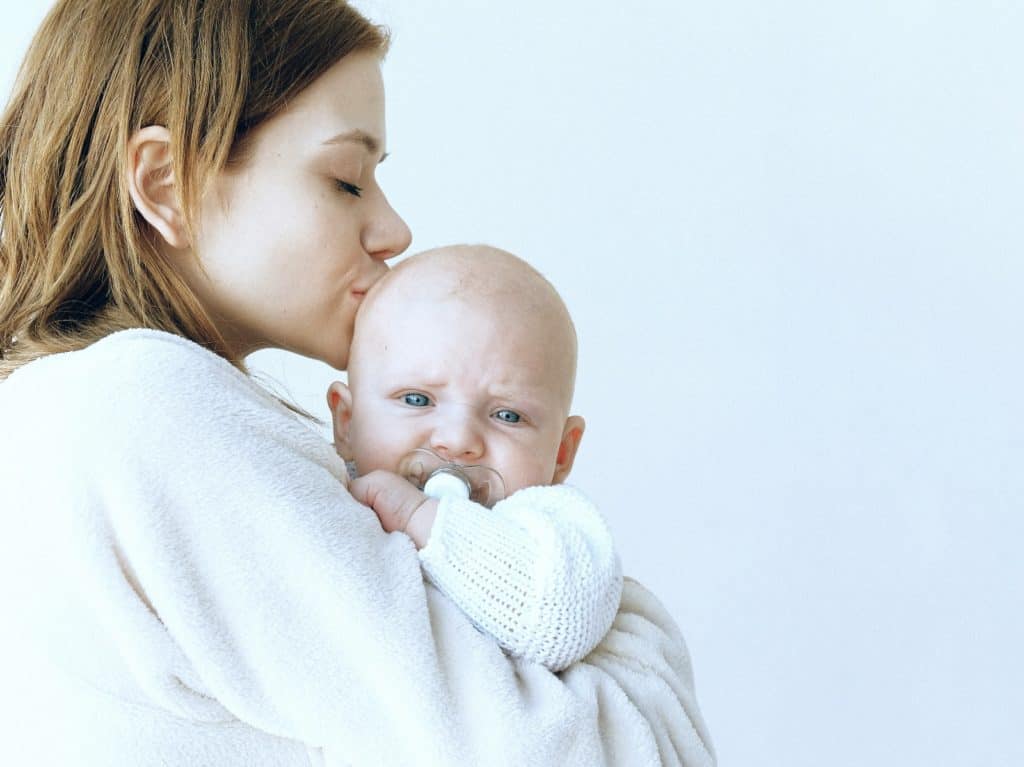
9 ways to soothe your crying baby when you don’t know the reason
As a mom, I have always found it heartbreaking to see my baby cry, especially when not knowing the exact reason behind it. Not being able to help and calm a screaming baby is hard.
Obviously, crying is one of the main ways of communicating for a newborn, and whatever the reason might be, a baby cries when trying to communicate a need.
There are some very basic methods of how to calm a crying baby. Try out these general comforting ways to soothe your baby when the specific need can’t be found and met right away.
Naturally, over time after your baby is born, you will get to know your child more and more. That will help you to identify specific needs more easily. And as your baby is growing, he or she also learns to communicate more specifically.
Did you know that babies are only able to control and cry consciously towards the end of the first six months of their lives? Please, don’t try to let your newborn cry out a situation! If your baby is crying, there is always a reason! Even if you are unable to identify it at the moment.
Even if you can rule out the most common reasons such as pain, a full diaper, or hunger, your baby may simply be crying because he or she cannot find rest. Or, it might be a season of a big leap in natural baby development, and your little one is just overwhelmed by it.
So, no matter the reason and if you are aware of it or not, make sure you give your baby your attention in the situation.
And try to always remember one thing above all: Keep calm!
Your baby feels your nervousness and the situation can get worse. Concentrate on the moment and relax. The child will feel your inner composure and when you hold him or her close, even your heartbeat. If you can stay calm and pass on peace, it will be much easier for your baby to calm down as well.
If you find yourself struggling to feel calm, or perhaps you might be physically exhausted, don’t be hesitant to get help. Put the baby in the arms of your partner, a friend, or your grandparents for a while.
There is no shame in getting help when you need it. A crying baby can be tough on the nerves, especially when already feeling sleep-deprived or physically exhausted.
If your baby is crying, obviously you should first check if there is a specific reason for it. Babies cry for a variety of reasons. Hunger, full diaper, pain from the umbilical cord stump, desire for attention, overstimulation, and fatigue are just a few of the possibilities.
Before trying techniques and methods that can soothe your baby, you should check whether a full diaper or a stomach ache may be the reason for the crying. The more you can find out and meet a direct need, the better.
If you checked through the above-mentioned points and still don’t know why your baby is crying, try out the following
9 ways of how to calm a crying baby

Disclosure: MyMommyHeart is a participant in the Amazon Services LLC Associates Program, an affiliate advertising program designed to provide a means for sites to earn advertising fees by advertising and linking to amazon.com
Rocking
Every newborn loves the feeling of being gently rocked. It reminds them of the feeling in mommy’s womb. Oftentimes, it can already be sufficient to walk up and down with a baby to help him or her calm down.
You can also go outside and take a walk or sit down in a rocking chair if available. Rocking chairs and gliders have the benefit of being comfortable for you as a mom as well.
Tapping gently or caressing
For some reason, rhythmic physical contact can help a crying baby to calm down. Try to hold your baby close to you with one hand with a gentle but secure grip. With the other hand, gently and slowly tap the baby’s little bottom or back to calm him or her down.
Make your hand hollow by folding your fingers as if you wanted to draw water from a bucket. This will make you sure you are tapping in a controlled manner and not too hard. The patting should be as rhythmic as possible.
Caressing is similar in effect to tapping. You can stroke your baby’s stomach, head, or forehead. Again, use a smooth and calm rhythm. If your little one likes a strong touch, you can apply a little more pressure with your hands.
Swaddling
Babies also love the feeling of being wrapped and surrounded by something soft. Again, it reminds them of the feeling in mommy’s womb where they were constantly surrounded by the warm amniotic fluid. Try to swaddle your baby in a swaddle cloth and see if it helps.
My son almost always immediately calmed down with this method and it was a lifesaver many times for me after he was born. Watch this video on YouTube if you don’t know how to swaddle and want to learn.
Swaddling worked especially well for us when combining with rocking the baby while tenderly saying “Shhhhhh”. It sounds very simple and obvious now – but it truly helped! I swaddled my baby, put him in my arms, rocked him, and hummed “shhh”. These methods combined were very helpful even for myself if I got too involved in crying as well.
Closeness
In the first three months, I find it particularly important to cuddle a lot. Babies don’t see that much yet, but they know your voice very well and can smell you. You feel nice and warm, and they can hear your heartbeat when they are on your chest. I firmly believe that you can’t spoil a baby of that age with cuddling and cuddling and more cuddling.
If your arms get tired over time or you just need two hands-free all whilst giving your baby that much-needed closeness, a baby carrier can be extremely helpful here.
There are all sorts of different kinds out there: simple cloth ones which you have to wrap around you and baby several times, front-backpack-styled ones to clip on, or a sling to slide in your baby. Try out which one works best for you!
Personally, I love the sling one for newborns. It’s easy and fast to put on and still shapes perfectly around the little body of the baby to give it a swaddled feeling.
Skin contact
Going hand in hand with the method of physical closeness is the obvious skin contact. Regardless of whether you are breastfeeding or not: your baby loves to feel your naked skin. It naturally smells better to your little one than any other thing in the world and keeps him or her reassured that you are right there.
When after a long day your baby is exhausted and only crying, try out to snuggle into bed together. Undress the baby and put it on your own body so that he or she can feel your skin and warmth. I and my husband used to do this a lot with our son after he was born. Even Daddy was well able to learn how to calm a crying baby with that method.

Breastfeeding
A feed can go hand in hand with direct skin contact. If you breastfeed your baby on demand (which I totally recommend), your baby will sometimes cry for your breast even when he or she is not hungry but mainly needs your closeness.
There might be days when you feel that your baby is constantly demanding to drink. That is absolutely normal and could be caused by either a growth spurt or, as mentioned, simply the need to “feel” mommy. Read more about breastfeeding your baby here.
Pacifier
As the name already indicates, a pacifier can help a crying baby to calm down very well. Babies are born with the natural desire to suck. They try to calm themselves down instinctively through sucking. Either mommy’s breast, their own fingers, or a pacifier if available.
Personally, I found the pacifier very helpful. If you want to avoid it, try to let your baby suck on your finger. Just try it out next time your little one is crying and hard to calm. You will be surprised by the fast effect this method usually has.
Singing and music
No matter if you are proud of your voice or don’t even dare to sing in the shower, your baby will love it when you sing for him or her. To hear mommy’s voice and a melody (even if it is out of tune) somehow helps a baby to calm down a lot.
If you don’t want to sing yourself, you can try to play some nice music. It won’t have the same effect since it is not your own voice. The melody and the input for the sense of hearing might still help your baby to be soothed.
Personally, I love singing. My son, who is now 19 months old, still almost always calms down quite fast from crying when I hold him tight, rock him, and sing him a song.
Background noise
As you know, for your unborn baby it was never completely silent in your belly. There was the constant sound of your heartbeat, your digestion, and obviously, your voice when you were talking. When you are having your first child, it can feel very quiet for the baby outside the womb in your home.
Some babies then prefer to hear some kind of constant background noise. It can help them to calm down. You can try to use that method with a suitable app that plays so-called “white noise”, which is a constant sound of background noise. Or there are also actual white noise machines which you can buy, for example here on amazon.
Constant background noise also helps with a sudden, loud noise. It won’t disturb your baby as much when there is already something playing in the background. Up to today, we still play white noise for our son in his room when bringing him to bed. It keeps other noises (e.g. kitchen clean-up, tv, and conversations…) in the further background and lets him fall asleep undisturbed.

So, these were my 9 top ways of how to calm a baby from crying
I hope, reading through the list has inspired you to try out one thing or another. Next time, when your baby cries and you can’t seem to find a reason or a direct need to meet, try it out. You got this momma! I am proud of you for taking good care of your baby!
Last but not least, I want to mention to rely on your gut feeling like a mommy! It is still the best companion for countless parents all over the world and will also be by your side. Somehow sometimes you just know, and you really do!
What to do when nothing seems to help to calm my crying baby?
After all, every baby is an individual and has its own little personality. Not all the methods mentioned will help your little one in a particular moment to calm down. If you feel exhausted and a screaming baby determines your everyday life, please do not hesitate to seek help and advice from a midwife, or your doctor.
Know that you as a mom have not failed! The fact is, that babies cannot speak yet and mainly communicate and process things through crying. It is part of their “language” and helps them restore their own balance. Obviously, never give up on being there for your little one and on trying to meet the needs, but also make sure to look after yourself and get help if needed. Remember that your baby needs a happy and rested mommy too, otherwise, things just get worse.

To find more helpful information and tips on pregnancy, birth, babies and motherhood check out my other blog posts.
If you are a first time expecting mom, read all you need to know about caring for your newborn here.


My baby loved singing and music. And of course BF was always a sure fire way to calm him. All of these are wonderful ideas. I actually didn’t know babies could not control their cries until 6month either-very insightful.